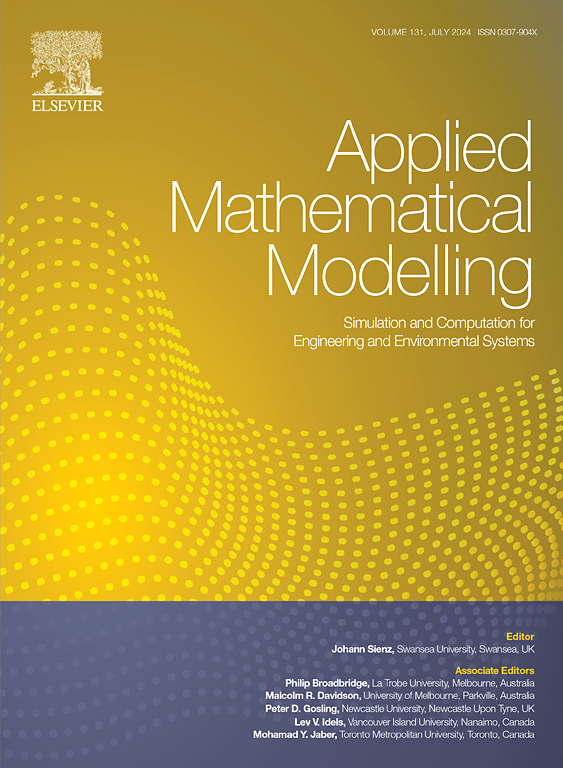在具有不确定性的多目标设计中获取稳健解决方案的策略
IF 4.4
2区 工程技术
Q1 ENGINEERING, MULTIDISCIPLINARY
引用次数: 0
摘要
本文提出了多目标优化问题稳健性的新定义。该定义是在不确定情况下获得稳健解决方案的创新策略的基础;它涉及在优化过程中将不确定情况下的成本函数表述为相互冲突的目标。这种方法旨在定义在所有情况下都不会同时被任何其他目标支配的决策向量。这些解决方案同时具有最优性和稳健性,与传统和非常规的多目标方法相一致。通过这种方法,可以隐式定义每种情景下的帕累托最优解,以及在最坏情况下优化性能的稳健解。此外,还定义了一组能优化所有不确定情景乌托邦点的全局性能的稳健解决方案。为了证明这种方法的有效性,本文讨论了两个控制设计问题。第一个例子是一个一阶过程,说明了优化策略的优势和各个方面。第二个问题是质子交换膜燃料电池堆的多回路温度控制设计,这是一个更复杂的工程问题,涉及到以前的研究成果。本文章由计算机程序翻译,如有差异,请以英文原文为准。
Strategy for obtaining robust solutions in multi-objective design with uncertainties
This paper proposes a novel definition of robustness for multi-objective optimization problems. This definition underpins an innovative strategy for obtaining robust solutions in the presence of uncertainty; it involves formulating the cost function under uncertainties as conflicting objectives during optimization. This approach aims to define the decision vectors that are not dominated in all scenarios simultaneously by any other. These solutions exhibit both optimality and robustness properties, aligning with conventional and unconventional multi-objective methods. This approach enables the implicit definition of the Pareto-optimal solutions for each scenario and robust solutions that optimize performance in worst-case scenarios. Additionally, the set of robust solutions that optimize the global performance concerning the utopian points of all uncertainty scenarios is also defined.
To demonstrate the effectiveness of this method, this paper addresses two control design problems. The first example, a first-order process, illustrates the advantages and aspects of the optimization strategy. The second problem, multi-loop temperature control design of a proton exchange membrane fuel cell stack, is a more complex engineering problem involving results from previous research.
求助全文
通过发布文献求助,成功后即可免费获取论文全文。
去求助
来源期刊

Applied Mathematical Modelling
数学-工程:综合
CiteScore
9.80
自引率
8.00%
发文量
508
审稿时长
43 days
期刊介绍:
Applied Mathematical Modelling focuses on research related to the mathematical modelling of engineering and environmental processes, manufacturing, and industrial systems. A significant emerging area of research activity involves multiphysics processes, and contributions in this area are particularly encouraged.
This influential publication covers a wide spectrum of subjects including heat transfer, fluid mechanics, CFD, and transport phenomena; solid mechanics and mechanics of metals; electromagnets and MHD; reliability modelling and system optimization; finite volume, finite element, and boundary element procedures; modelling of inventory, industrial, manufacturing and logistics systems for viable decision making; civil engineering systems and structures; mineral and energy resources; relevant software engineering issues associated with CAD and CAE; and materials and metallurgical engineering.
Applied Mathematical Modelling is primarily interested in papers developing increased insights into real-world problems through novel mathematical modelling, novel applications or a combination of these. Papers employing existing numerical techniques must demonstrate sufficient novelty in the solution of practical problems. Papers on fuzzy logic in decision-making or purely financial mathematics are normally not considered. Research on fractional differential equations, bifurcation, and numerical methods needs to include practical examples. Population dynamics must solve realistic scenarios. Papers in the area of logistics and business modelling should demonstrate meaningful managerial insight. Submissions with no real-world application will not be considered.
 求助内容:
求助内容: 应助结果提醒方式:
应助结果提醒方式:


